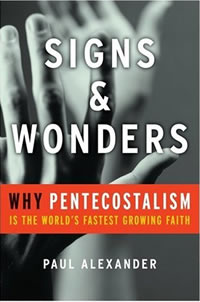Book Notes
 Paul Alexander, Signs and Wonders; Why Pentecostalism is the World's Fastest Growing Faith (San Francisco: Jossey-Bass, 2009), 175pp.
Paul Alexander, Signs and Wonders; Why Pentecostalism is the World's Fastest Growing Faith (San Francisco: Jossey-Bass, 2009), 175pp.
Paul Alexander is a professor of theology at Azusa Pacific University and a fourth generation Pentecostal from Kansas. After studies at Pentecostal institutions for his bachelors and masters degrees, Alexander earned his PhD in religion at Baylor University, a time and place when he says he became an atheist. But he came back to the fold, and so it would appear that he's the quintessential insider who has enough critical distance to be a reliable guide to Pentecostalism.
There are about two billion Christians in the world, and roughly 500 million of them are charismatic or Pentecostal. Although unknown, dismissed, or ignored by many, in the last few decades demographers, sociologists, historians and theologians have given charismatic Christianity the scholarly due it deserves. The works by Harvey Cox of Harvard (Fire from Heaven, 2001), Grant Wacker of Duke (Heaven Below, 2003), and Philip Jenkins of the University of Pennsylvania (The New Faces of Christianity, 2008, and The Next Christendom, 2002 ) all come to mind. Alexander's simple survey will not displace more scholarly treatments like these few examples, but it's a welcome addition to a growing literature on an important phenomenon.
In eight chapters Alexander explores the appeal of Pentecostal faith. People believe God can and does intervene in their personal lives (miracles); they appeal very deliberately to the affective or emotional element in worship, music, and speaking in tongues; they affirm that God wants to bless people (while denying the "heresy" of the prosperity gospel); they tell their stories to each other; they acknowledge the reality of spiritual warfare; they make a place for dreams and visions; and they offer hope and joy to ordinary believers.
At times Alexander sounds a little glib and credulous, but he's hardly unaware of the traditional critiques of these eight points, or of their practical abuses. He's seen every fake and fraud there is, and on occasion he names some names (Tilton, Copeland, Warnke, etc.). He's especially strong on combining what Pentecostals consider to be the Biblical support for their beliefs with stories from personal experiences all around the world (Nigeria, Brazil, Tanzania, Korea, the Philippines, etc.). I think Martin Marty of the University of Chicago got it about right in his foreword: "I winced in some stories, winked when some explanations asked too much of me, kept my fingers crossed as I turned pages — and yet was strangely moved."


